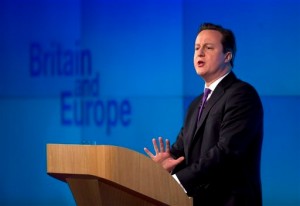

Follow us on:  
|


Prime Minister David Cameron makes a speech on having a referendum on staying in the European Union in London, Wednesday, 23 January, 2013. [AP]
He argued for a referendum on continued involvement with the EU should he win re-election in 2015, a promise he first made during his election campaign in 2010.
Cameron wants to thoroughly re-examine and then renegotiate the UK’s relationship with the EU, and then let the British people “have their say”, with a “simple choice” between staying in on the new terms, or leaving.
He said that if he managed to secure a new relationship that was in Britain’s interests, then he would campaign “heart and soul” for a ‘Yes’ vote in the referendum to stay in the EU.
“It is time for the British people to have their say,” he told reporters in London. “It is time to settle this European question in British politics; I say to the British people: ‘This will be your decision’.”
Powers
Despite the strong rhetoric in the speech, Cameron did not outline which powers he would like to se repatriated to the UK as part of any new settlement, nor would he be drawn on what would happen if the negotiations did not go his way.
Answering questions after the speech, he said he did not enter into negotiations if he did not feel he had a good chance of getting his way, although he also warned that: “If we left the European Union, it would be a one-way ticket, not a return.”
He called for “a proper, reasoned debate”, but he did not feel that “the steps which would be needed to make Britain, and others, more comfortable in their relationship in the EU are inherently so outlandish or unreasonable.”
A number of MPs, both within Cameron’s own ruling coalition and among the opposition, in addition to European and US leaders have criticized the PM’s approach saying it comes at precisely the wrong time when Europe is coping with recession.
‘Cherry picking’
Reaction from Europe was swift; French foreign minister Laurent Fabius responded by saying: “You can’t do Europe à la carte… imagine Europe is a football club and you join, once you’re in it you can’t say: ‘Let’s play rugby'”.
Meanwhile the German foreign minister Guido Westerwelle said Germany wanted the UK to “remain an active and constructive part of the European Union… cherry picking is not an option”.
Westerwelle reiterated the views of German chancellor Angela Merkel that Europe needed more integration, not less.
Cameron was originally scheduled to deliver his speech in Amsterdam on January 18, but postponed the event due to the then violent standoff between the Algerian military and an Al-Qaeda affiliated group at a gas processing plant.
Dozens of foreign workers, including up to six Britons, were killed in the Algerian operation.
With Inputs from Agencies.